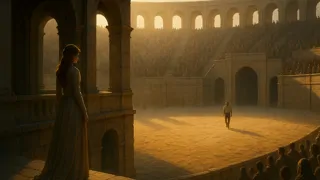Introduction
Justice isn’t always born of deliberation or law—at least, not in the fabled kingdom of Aramour. Here, at the empire’s resplendent center, stood an arena famed as much for its opulent marble colonnades as for its chilling tradition of determining guilt and innocence. While neighboring realms fretted over procedural debate, Aramour gave its fate to the spectacle. In a single, breath-stealing moment, an accused was marched to the sandy floor to face two doors: behind one, the glitter of hope and a lady in waiting; behind the other, a caged tiger—a swift, brutal execution of royal will. The intrigue and horror of this decree drew thousands, filling the terraced seats with nobles and commoners, merchants and minstrels, hungry for the instantaneous drama of it all. Thrill, suspense—and, some whispered, a touch of cruelty—scented the very air. King Azarel, imposing and unyielding, cherished the spectacle’s discipline: luck, the will of gods, and the unpredictability of the human heart determined everything, rendering appeals pointless. When it came to matters of passion, however, justice could grow particularly merciless. That year, whispers sifted through every corridor and corner: the king’s beautiful daughter, Princess Kaela—fiery, intelligent, and fearless—had fallen in love with Darius, a young guard of humble birth. The forbidden romance blossomed under starlit arches and in secret corners, filling their days with vibrant longing and perilous hope. Their affection, once discovered, erupted into scandal. Betrayed by a jealous confidante, their secret was spilled before the unforgiving throne. The king, his pride wounded and suspicion stoked by fears of insurrection, condemned Darius to the arena, laying the fate of two hearts in the hands of fate and palace intrigue. Now, as dawn blushed over the city’s colonnades, thousands crowded every terrace. The sand was raked smooth, the doors burnished with silent promise. Darius stood in the center of destiny’s ring—alone but for Kaela’s gaze, piercingly loyal, fiercely uncertain. In the suffocating silence, the kingdom braced for a choice that would ripple across not only two lives, but the very spirit of Aramour itself.
The Arena’s Shadow and the Lovers’ Secret
Long before the morning of Darius’s trial, the arena’s legend had grown into both a caution and a carnival. Generations had watched fate’s wheel turn behind those infamous doors: a baker ordered for theft, a merchant’s daughter accused of blasphemy, a knight suspected of treason. Each time, the crowd roared for spectacle; sometimes for justice, sometimes for the delicious ambiguity justice rarely brought.

This arena was an omnipresent part of daily life in Aramour. The marketplace bristled with tales of luck and terror—children dared one another to approach the doors after hours, tracing claw marks on the ancient wood and whispering about the blood still staining the sand beneath. Yet, the true horror and fascination of the spectacle was not in the punishment, but in the secrecy. Even the king himself was said to know neither door’s contents once the locks were sealed and the lot drawn.
Princess Kaela grew up amidst these stories, hearing them from her old nurse by the light of the hearth, her young mind stretched by the paradox of law and luck combined. She admired her father’s strength but bristled beneath his rigid rule. Her mother, Queen Indira, was more compassionate, trying to temper the king’s iron with gentler justice, though her words fell often upon ears deafened by pride and protocol.
Kaela’s beauty and intellect drew many suitors, nobles with lands and titles and ancient bloodlines. Yet none enchanted her like Darius. He was not born to court intrigue. Son of a stonemason, Darius joined the king’s guard for honor and necessity, his earnestness shining in a world of subterfuge. Their meetings blossomed beneath the temple’s ruined arches and in secret gardens laced with moonflowers. What began as a brush of hands deepened into a love fierce enough to challenge tradition.
It was Kaela’s friend, Lady Miren, who betrayed them. Spurred by jealousy and ambition, Miren let slip their secret before a banquet, painting Darius not as a devoted lover but as a scheming seducer. The king’s fury tore through the palace. Failing to wring a confession from Darius, Azarel condemned him to the trial of doors—a finale as much for the public’s pleasure as for his daughter’s instruction. Yet, something in Azarel’s decree betrayed subtle cruelty: he chose Kaela herself to determine which maiden would stand behind the arena’s fateful door, while another royal adviser would assign the tiger, both in absolute secrecy.
As the city buzzed with rumors and wagers, Kaela retreated into solitude. Torn between her love for Darius and the storm of betrayal and jealousy swirling within, she contemplated the ordeal ahead. She knew the woman who dared stand behind the second door: Isolde, a fierce-born beauty whose loyalty to Kaela was unwavering but whose feelings for Darius remained ambiguous. Thus, Kaela’s own emotions formed the hidden heart of the trial: Would she direct her lover to life with another woman, knowing it meant she might never see him again—or would she, in the blackest impulse, let fate’s tiger loose upon him, denying herself and the realm the pain of that parting?
The Morning of Judgment
On the day of reckoning, Aramour seemed suspended between hope and dread. Sunlight glistened coldly off the tallest pinnacles. The arena smelled of damp marble, oiled leather, and the sweet, nervous undertone of anticipation. Vendors hawked sweetmeats and cordials, while falcons circled high above, scattered by the sound of the opening fanfare.

Darius was brought forth, stripped of his uniform. He stood upon the arena floor in plain linen, every eye upon him except one pair—the king’s, vigilant as a hawk, peering from behind his regal mask. Kaela waited in the royal box, clad in white, her hands cold beneath folds of embroidered silk. She searched the crowd for her mother’s gentle reassurance and found only more questions.
A hushed rumble passed through the crowd as the king rose. “Aramour’s heart beats with courage today,” he thundered. “Let our laws be honored. Let fate speak for us.” The city fell still. All eyes, sensing drama far greater than ordinary guilt or innocence, fixed on Kaela. She pressed a signet ring—a token she secretly gave Darius—in her palm, summoning the memory of secret meetings, whispered laughter, futures once painted with reckless faith.
Kaela signaled, almost imperceptibly, to the right-hand door. The sand felt thick with unreleased adrenaline. Darius caught her gaze; in that moment, lifetimes passed. Would she deliver him to safety, even if safety meant surrendering him to another? Or would love, tainted by fear and anguish, turn its hand to vengeance?
He approached the door and pressed his palm to the carved wood. Time dripped slow and heavy. For a heartbeat, Darius dared hope he would emerge into the arms of a woman who loved him, even if her name was not Kaela. He nearly missed a shadow—a movement in the stands, just at the edge of his vision. A signal, perhaps? Or nothing at all?
As Darius gripped the handle, Kaela’s mind raced, revisiting a single moment from the night before, when she’d traced the doors in darkness, second-guessing her preparations and motives. She’d stood before each, whispering silent bargains to the gods, half-tempted to throw open every secret and end the charade. Instead, she had assigned Isolde to the right, and the rest she’d left to fate and her own ability to guide Darius subtly. But her own heart now clawed at her certainty: Had she really set her beloved on the path to joy, or let jealousy slip into the king’s labyrinth of punishment?
The hinges shrieked in protest. The ancient wood swung open. For a split second, silence blanketed the arena. Then, gasping with dread and disbelief, the crowd surged to its feet—all eyes straining to see what emerged from the darkness beyond the threshold.
The Reckoning and Echoes of Choice
For the longest moment, time froze. The silence fractured by the screech of a rusty bolt, Darius’s heart thundered in his ears. Darkness spilled from the space behind the door. The world seemed to tip, as if all of Aramour balanced on this uncertain precipice.

Out stepped—Isolde. Her head was bowed, her silver-gold hair tumbling over ceremonial ribbons. Darius saw her for what she was: neither threat nor savior, but another soul snared in this cruel ritual. The crowd erupted in paradoxical joy and disappointment. Darius was spared, yet not the future he yearned for. The king’s decree rang out—a wedding, celebrated before the kingdom’s eyes, binding Darius and Isolde forever.
Kaela’s chest swelled with agony and pride. She had chosen mercy, trusting that life—no matter how undesired—was better than bloody death. Yet, as the joy of survival washed about her, grief churned within her. She loved Darius too much to condemn him, not enough to watch him silently slip into another’s arms without regret. Tears threatened to betray her composure.
But the fates conspired yet. Isolde, ever loyal to Kaela, knelt before the king after the audience dispersed. “Your Majesty, my duty is to you and your daughter. I cannot accept this bond under such circumstances. The man’s heart belongs to another.” Her words, ringing sincere, drifted through the court like a cleansing wind. For the first time in his rule, King Azarel paused before the iron of his own will.
He summoned Kaela alone. There, in the towering shadow of ancestral portraits, king and daughter stood opposites in a contest of resolve and vulnerability. Kaela, proud and unflinching, met his gaze. “You taught Aramour strength—let it also know mercy.”
Azarel’s stoic heart betrayed a tremor. Duty to the throne warred against love for his child. He relented, not with joy, but with weary concession. Darius was freed, neither wedded nor slain, his fate no longer in the jaws of ritual spectacle but forever marked by the uncertainty of love’s worth. The arena’s shadow would linger, but, that day, compassion had won a narrow, remarkable victory.
Years later, storytellers would debate behind which door the tiger waited—arguing whether Darius was destined for doom or for a life parted from his love. Yet none could ever speak for certain, for the only truth lay buried in Kaela’s heart: that every great choice carries splinters of salvation and ruin, and in seeking to save someone we love, we confront the truest, most perilous wildness within ourselves.
Conclusion
Spectacle can determine the fate of bodies, but never the true reach of the human heart. Princess Kaela’s choice in the arena sent ripples through Aramour for generations, questioned by poets, debated by counselors, whispered through lovers’ meetings in moonlit gardens. Some claimed she doomed herself—others, that she sacrificed for love’s sake. Truth rested, as it ever did, beyond the reach of judgment and in the very core of her private torment and relief. For to truly love means to brave the pain of giving up what you wish most to keep. The arena’s doors closed at last, as all eyes drifted away, but the lessons of chance, forgiveness, and the wild pulse of human desire lived on, immortal as legend in the hearts of all who seek to understand the price of love and the weight of mercy.


















